- Department of Agronomy, University of Fort Hare, Alice, South Africa
Dovyalis caffra commonly known as Kei apple, is an indigenous tree from the Salicaceae family, naturally found in the Eastern Cape region of South Africa, with a significant potential to address food insecurity and climate resilience challenges in rural areas. This review aims to evaluate the production potential, uses, and socio-economic contributions of D. caffra, focusing on optimizing its cultivation and market integration through indigenous knowledge and agroforestry system. The research was conducted in the Eastern Cape province of South Africa. Research was conducted using online databases such as ResearchGate, PubMed, and Google Scholar, focusing on keywords like “food security,” “Dovyalis caffra,” and “indigenous trees.” Secondary data was gathered from previous studies, and conclusions were drawn from related research. Additionally, a case study involved interviews with five tree growers/sellers in the Eastern Cape, assessing the challenges and benefits of cultivating and marketing D. caffra. Findings revealed that some growers are motivated to promote Indigenous species, recognizing the economic and ecological benefits of cultivating Kei apple. The tree’s resilience to climate change, soil degradation, water scarcity, and pest infestations makes it a promising alternative to traditional crops. Additionally, its cultivation can diversify food sources and enhance community resilience. Promoting indigenous trees like D. caffra through agro processing can maximize their economic value while supporting local communities and sustainable forestry practices.
1 Introduction
Climate change is widely acknowledged as a major factor contributing to diminished productivity in agriculture and shortages of food in Southern Africa as well as developing countries (Mdoda et al., 2025). The Food and Agriculture Organization (FAO, 1996) defines food security as a situation whereby all people have economic, social, and physical access to enough, nutritious, and secure food that fits their food preferences and dietary requirements for a life of wellness and activity (Mutengwa et al., 2023). However, in Southern Africa achieving food security is a daunting task given the region’s multiple stressor environment (Raza et al., 2025). Climate change manifests itself in extreme weather events that negatively affect Southern African agriculture, including heat stress, floods, droughts, rising temperatures and pest invasions (Mutengwa et al., 2023).
Rural food systems have been influenced by climate change, endangering the security of food and nutrition in developing countries (Myers et al., 2017). Numerous studies have emphasized the possible role that underutilized plants could play in such circumstances (Ogwu et al., 2024). Although there is growing interest in these underutilized plants, there are still significant research gaps. Indigenous plants, such as Dovyalis caffra from the Salicaceae family, can provide valuable resources during times of food scarcity and require minimal water (Omotayo et al., 2018). Climate change and food shortages make indigenous plants, such as D. caffra, a valuable resource for the growing global population.
This review explores the present condition of the lesser-known indigenous plant, the Kei-apple tree, emphasizing its advantages, applications, and potential to aid national development objectives. It focuses on how this plant could support rural communities in adapting to climate change, enhance food security, and create job opportunities. Through a case study carried out in South Africa’s Eastern Cape province, the review provides insights into the growing, promotion, and sale of indigenous trees like D. caffra. These plants, such as D. caffra, are drought tolerant, nutrient-rich, and culturally significant, providing a sustainable source of food and income for rural people.
1.1 Origin and distribution of Dovyalis caffra
1.1.1 Geographical distribution
Dovyalis caffra, commonly known as the Kei apple, is indigenous to the Kei River region in southwest Africa and is widely distributed in the surrounding areas of Eastern Cape and the KwaZulu Natal (Aremu et al., 2017). It is also cultivated in the north-western region of South Africa (previously called, Transvaal). This plant was first introduced to England in 1838, and from there, it spread to regions including the Philippines, northwestern Australia, Egypt, Algeria, southern France, Italy, Jamaica, southern California, and Florida (Tadesse, 2023). The plants create an impenetrable hedge barrier when they are planted closely together.
Kei apple typically thrives in areas with a Mediterranean climate, such as hills and mountains along coastal regions. It can tolerate mild drought and prefers sandy or loamy soil with good drainage. Although it is found in other parts of South Africa, Namibia, and Angola, its cultivation and introduction as an ornamental plant with edible fruits have led to its spread worldwide (Waweru et al., 2022). Today, D. caffra can be found in a number of nations, such as Brazil, United States, Australia, Israel, and New Zealand, where it thrives in conditions that are conducive to its growth as shown in Figure 1.
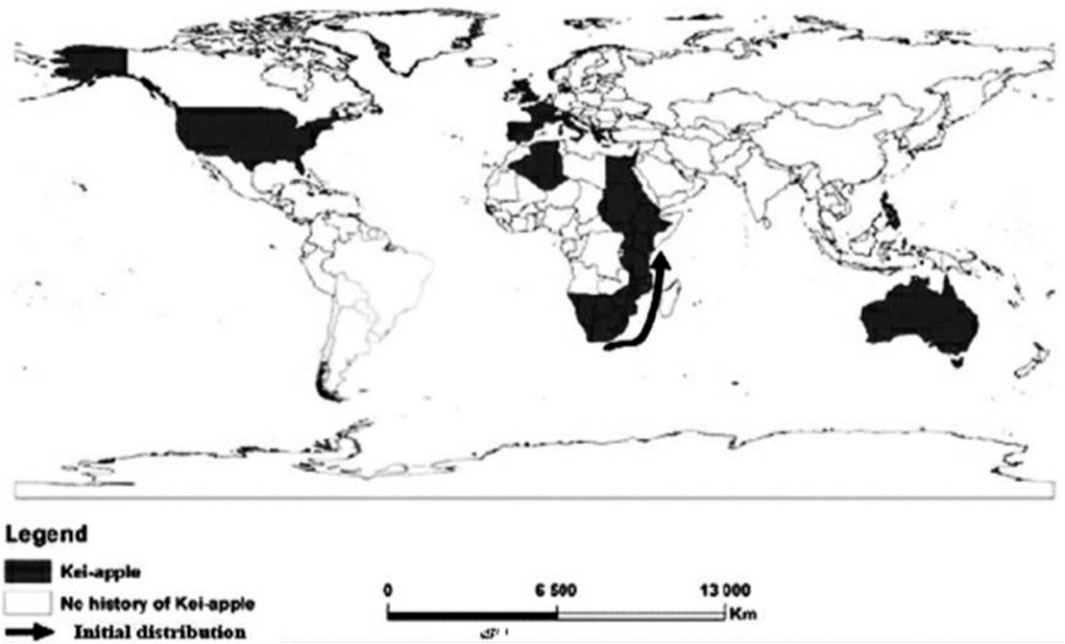
Figure 1. Distribution and global occurrence of Dovyalis caffra (Waweru et al., 2022).
1.2 Characteristics and botanical description of Kei apple
Dovyalis caffra tree is an evergreen that bears little golden apples-like fruits. The tree is covered in a thick fruit layer with a vibrant scent and a yellow pulp beneath its tough, slender skin (Tadesse, 2023). This subtropical plant is frost and drought-tolerant, making it a shrub or small tree with moderate hardiness (Wilken et al., 2024). Its lush green foliage, which offers year-round screening and shade, reaches heights of 3–8 m. On young branchlets, the bark is smooth; on older branches and stems, it is fissured, flaky, or corky. The tree crown is heavily branched, and while the stem has few thorns, young branches typically have 40–70 mm thorns as shown in Figure 2 (Waweru et al., 2022).
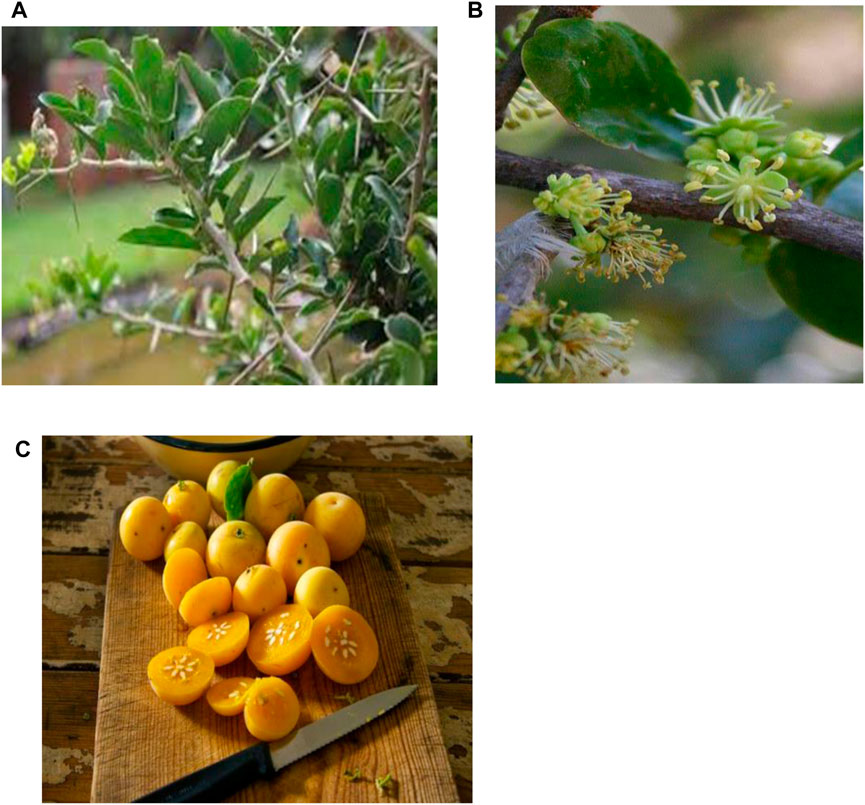
Figure 2. Traits of Dovyalis caffra: (A) D. caffra tree with thorns, (B) Kei apple tree at flowering stage, and (C) Fruits and seeds of Kei apple (Augustyn et al., 2016.ppt).
The Kei apple features plain leaves often grouped closely together on its small lateral branches. These leaves are glossy and dark green. There are about 35 noticeable veins that extend from the base on both sides, and they are 20–55 by 5–30 mm in size, with a narrow to broad obovate-elliptic shape. The petiole can grow up to 5 mm long, and the leaf apex is round with an occasional notch. The base tapers to a narrow round with a margin and a slight roll under (Orwa, 2009). In the leaf axils, the female flowers can be seen in clusters of three or more on stalks that are 4–10 mm long, male flowers on the other hand are found in dense clusters of five to ten and are 3 mm long.
1.3 Uses and importance of Dovyalis caffra
Dovyalis caffra has multiple uses. It can be planted as a border fence or as an impenetrable hedge to keep humans and animals out of a garden. The leaves are utilized by bees for foraging and as fodder, or bulk feed for cattle (Nouman et al., 2014). The edible fruits which are rich in vitamin C content (17 mg per 100 g), are used to make jams. Fermenting fruits yields an acidic herbicide (Omotayo et al., 2018). However, there is currently no evidence to suggest that this fermented fruit-derived herbicide is available for commercial purposes.
Currently no commercial products based on Kei apple herbicide are available or been documented at agricultural markets and/or scientific literature.
1.3.1 Dovyalis caffra uses in agro forestry
Kei apple is a spiny shrub or moderate-growing tree widely used in agroforestry, particularly as a live fence in African landscapes. When planted at high density it creates a sturdy hedge with trees or shrubs arranged in straight or zigzag rows, 30–90 cm apart (Epenhuijsen, 1976). Its prickly structure and unappealing foliage increase its effectiveness as a barrier by making it extremely resistant to goat and other animal grazing (Omotayo et al., 2018). In addition to serving as ornamental borders for homes, animal sheds, and farms, these prickly hedges also serve as a deterrent to thieves.
Live fences as shown in Figure 3 serve several important functions. They help control the movement of both domestic and wild animals, mark cultivated areas, and act as fire-resistant buffer zones for crops (Dharani, 2019). The use of dense, thorny vegetation, such as Kei apple combined with shrubs and climbing vines, increases the fence’s ability to deter animals. For example, denser fences are necessary to deter young goats, while larger animals might require different specifications (Tadesse, 2023).
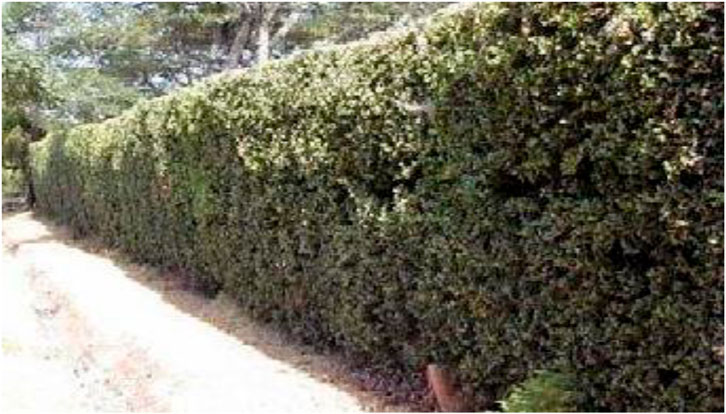
Figure 3. Kei apple fencing (Tadesse, 2023).
1.4 Dovyalis caffra’s potential health benefits
Dovyalis caffra is an important fruit tree that produces aromatic fruits that resemble apricot-like fruits, which can be consumed both cooked and raw by humans and wildlife, addressing food insecurity and malnutrition with essential nutrients (Maroyi, 2018). The fruit pulp is rich in fatty acids (0.5–1.2 g/100 g, primarily linoleic acid at 0.3–0.7 g/100 g), proteins, carbohydrates, and vitamin C (17 mg/100 g) (Waweru et al., 2022; NRC 2008). Compared to apricots (1.5–2.0 g/100 g fatty acids) and plums (0.7–1.5 g/100 g), Kei apple has lower fatty acid content but higher vitamin C making it a valuable dietary resource (Maroyi, 2018; Waweru et al., 2022; Xu et al., 2025). Due to the high acidity, the fruit is cut in half, peeled, and the seeds are removed. It is then sprinkled with sugar and let rest for a few hours before serving. This dish is usually served as a dessert. Additionally, D. caffra fruits are used to make dried fruit, syrups, shortcake, jam, jelly, and fruit salads additions (Qanash et al., 2022).
1.4.1 Medicinal use of Dovyalis caffra
Dovyalis caffa has a long history of traditional medicinal uses. According to ethnobotanical evidence, the Kei apple is used in both traditional and modern medicine, especially to help those with gout and pain management (Clement et al., 2023). According to research on ripe Kei apples by Qanash et al. (2022), the fruit has a strong acidic flavour that requires sweetening before eating. High-performance liquid chromatography (HPLC) analysis discovered several compounds in Kei apple extract as shown in Figure 4, such as phenols and flavonoids, etc. Higher dietary flavonoid consumption has also been linked in other studies to a lower risk of cardiovascular disease and some forms of cancer (Sesso et al., 2003). A 2017 meta-analysis indicated a 14% decrease in cardiovascular disease mortality associated with elevated flavonoid consumption (Kim and Youjin, 2017), whereas a 2019 review and a 2025 meta-analysis documented diminished risks of multiple cancers, including a 24% reduction in lung cancer risk (Rodríguez-García et al., 2019; Yang et al., 2025).
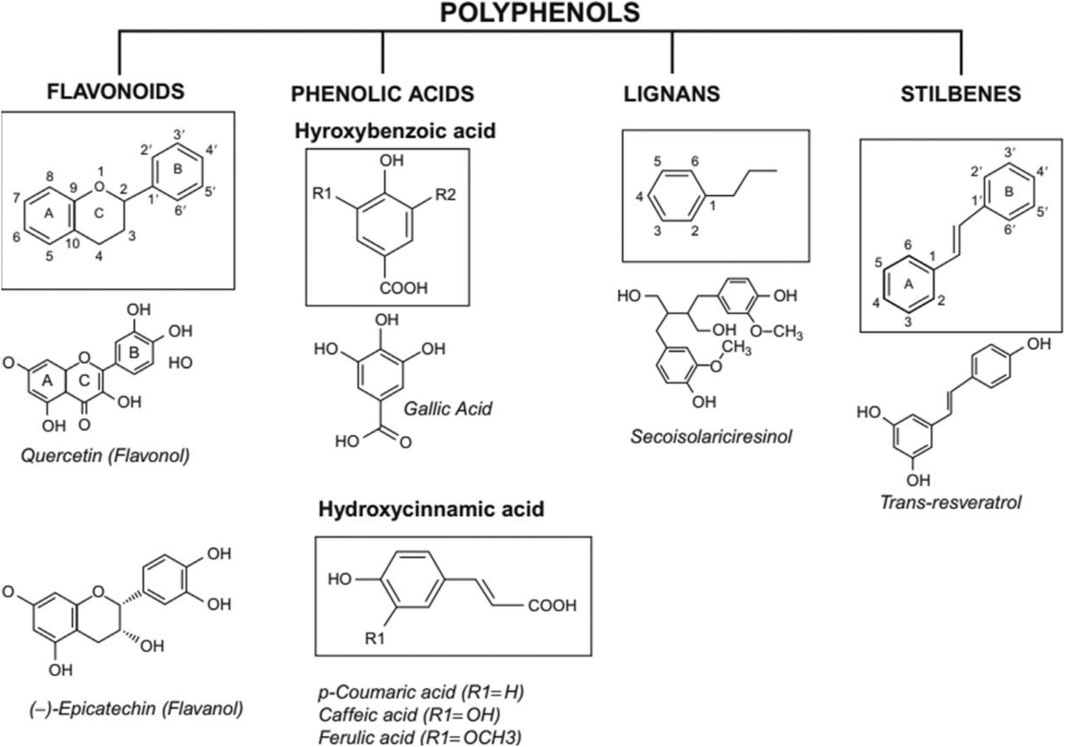
Figure 4. Fundamental structure of Polyphenols (Celep et al., 2014).
Vitamin C has been shown to improve vital physiological functions and prevent diseases like atherosclerosis, cataracts, diabetes, glaucoma, the common cold, stroke, heart diseases, and macular degeneration. Other phenolic compounds found in the extract are chlorogenic acid, catechin, gallic acid, hesperidin, rutin, ellagic acid, kaempferol, apigenin, and quercetin. Chlorogenic acid (Table 1) was found to be the most abundant phenolic ingredient in the extract, followed by gallic acid and catechin. This finding is shown to be the main phenolic compound in Kei apple fruit by Taher et al. (2018), who also noted that it was present in comparable concentrations.
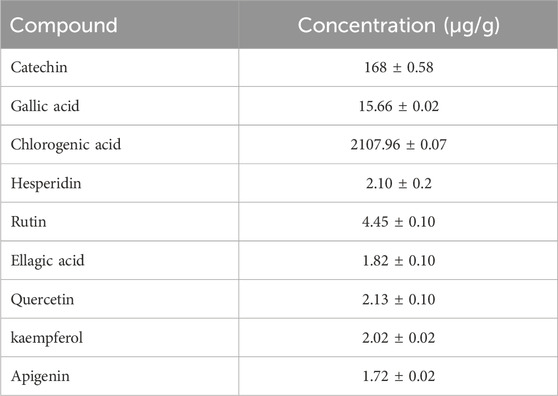
Table 1. Flavonoid and Phenolic contents of Dovyalis caffra fruit extract (Qanash et al.,2022).
Research conducted in vitro demonstrated that D. caffra contains strong antimicrobial, antioxidant, antiviral, and anticancer effects (Simelane et al. 2013). The extracts from the seeds have demonstrated significant antibacterial activity against Staphylococcus aureus, with a minimum inhibitory concentration of 1 μg/mL (Al-Habib et al., 2010). Plant extracts containing these phytochemicals have been associated with a variety of pharmacological activities (Ogbole et al., 2023).
Research by Al-Rajhi et al. (2022) emphasized the potential of D. caffra in environmentally friendly production of silver nanoparticles, demonstrating efficacy against clinical pathogenic bacteria and cancer cells (AgNPs). These AgNPs, produced using D. caffra, shown effectiveness against clinical pathogenic bacteria and cells, likely attributable to the antibacterial and anticancer capabilities of silver, potentially augmented by the bioactive chemicals in the plant extract.
1.5 Production strategies that can be adopted
Agroforestry represents one of the oldest practices in the world. It has been estimated to exist for over 1300 years (Santoro et al., 2020), with over 1.2 billion practitioners worldwide (Zomer et al., 2023). Agroforestry enables farmers to cultivate multiple goods and services on the same piece of land in a cohesive way, addressing a wider range of demands. By incorporating trees into their agricultural practices, farmers can reap economic, social, and environmental benefits, including enhanced food security (Jones-Garcia and Krishna, 2021). To guarantee a year-round food supply, farmers are expanding production, creating various revenue streams, and cultivating a mix of indigenous and exotic fruit trees (Dawson et al., 2014). Farmers can depend on the Kei apple fruit trees to act as a safety net and provide a consistent food supply or source of income during times of rising food prices or harvest failures (Omotayo et al., 2019). Agroforestry systems contribute to ecosystem services, which further reduce food insecurity (Clark and Nicholas, 2013). Planting trees alongside crops establishes microclimates that shade crops from direct sunlight and rain, protect them from pests, erosion, and floods, improve soil fertility, and promote animal production. Agroforestry also helps to maintain populations of pollinator species like birds and insects, which are critical for many crops. Increased biodiversity caused by incorporating trees into agricultural land improves rural farmers’ food and nutrition security (Clark and Nicholas, 2013).
Implementing organic soil management techniques such as mulching and composting can enhance soil fertility and structure, providing the trees with the necessary nutrients for optimal growth. Suitable irrigation practices, like drip irrigation or swales, can assist in managing water efficiently, ensuring the trees receive adequate moisture without becoming excessively waterlogged, which is vital for their health and fruit yield (Wach, 2020).
The techniques of pruning and thinning are vital for growing Kei apples. Consistently eliminating crowded branches encourages fruit growth and reduces the likelihood of disease by enhancing airflow and allowing more sunlight to reach the plants. In addition, growing trees in permaculture systems where they are arranged in circular beds with crops that rotate can improve nutrient cycling, maximize resource utilization, and produce a microclimate that is advantageous to all plants (Zhang et al., 2018). Moreover, supplying local farmers with the knowledge and abilities necessary to effectively implement these practices can empower them through community education and training programs focused on improved agricultural methods (Ogwu et al., 2024). By adopting these enhanced cultivation techniques, it is possible to significantly improve food security and foster regional economic growth, while also increasing the yield and quality of Kei apples (Zhang et al., 2018)
2 Research methodology
The research methodology involved utilizing online research engines such as ResearchGate, PubMed, and Google Scholar as data sources. Key topics, including “Food security,” “D. caffra,” “indigenous trees,” and “effect of low nutrition on plants,” were searched to gather secondary data from prior publications. The findings and conclusions were derived from the analysis of relevant studies and their results. A questionnaire was compiled and used for a case study interviews with five tree growers and sellers in South Africa’s Eastern Cape province. Participants were selected based on their experience in growing and selling D. caffra or other indigenous trees, ensuring diverse perspectives from individuals involved in propagation, growing on, sales, or direct planting within the region. The case study was designed to collect in-depth knowledge into the problems and benefits of growing and marketing trees such as D. caffra from the perspective of the tree growers/sellers. Interviews focused on the type of tree, demand and quality of trees from consumers and landscape contractors. Information was also collected on how product lines were selected and interactions with consumers/buyers in how they manage their tree production program. Semi structured in-depth interviewing involved interviewing a limited number of respondents in-depth one-on-one to learn more about their opinions of the tree businesses and to gather information about how they felt about answering structured questions. Qualitative data, which is descriptive in nature, captures observable qualities and characteristics that provide insights into experiences, perceptions, and behaviors as shown in Table 2.
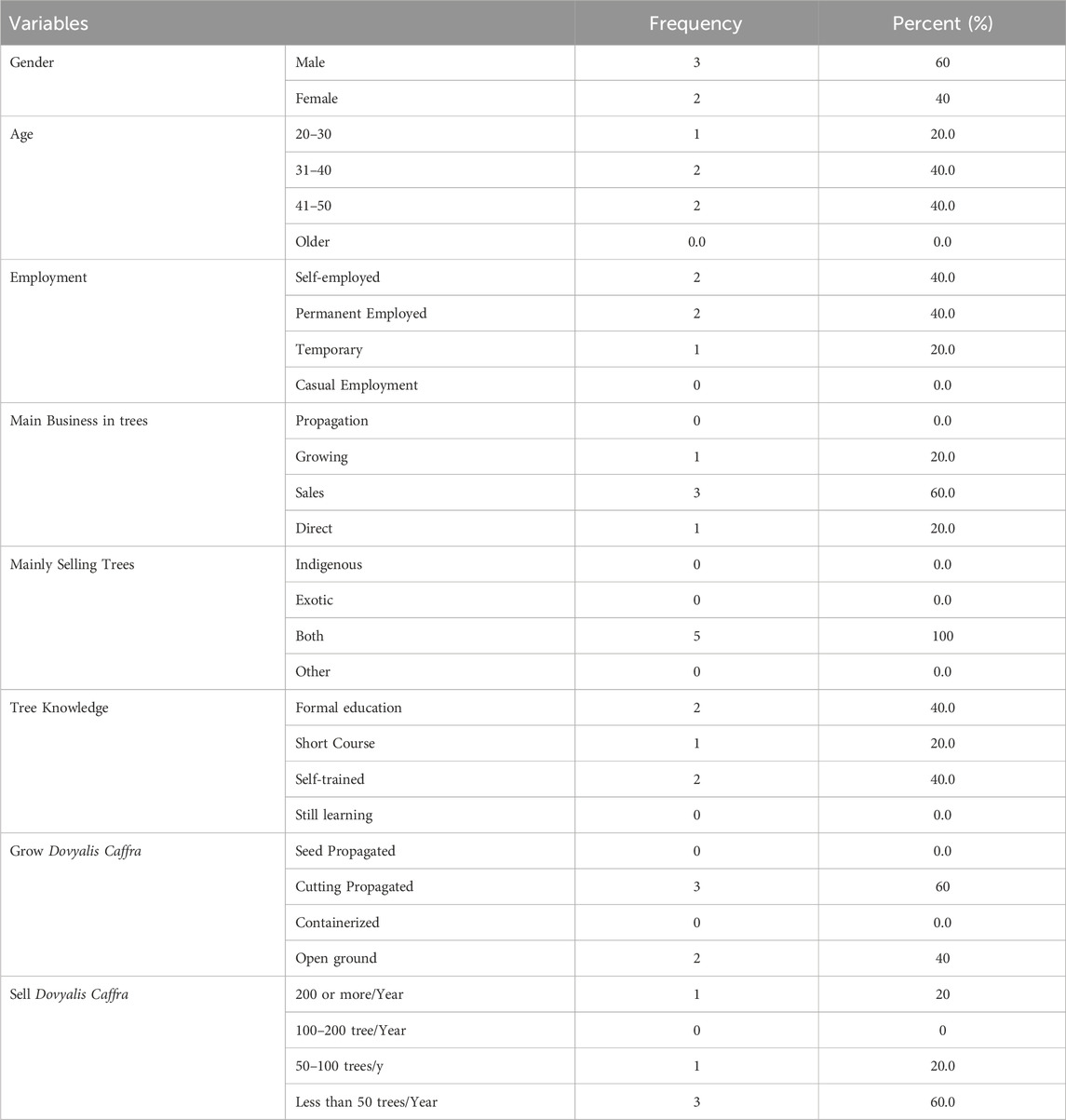
Table 2. Demographic and geographical data of participants of the Eastern Cape who were interviewed for the research study.
2.1 Data analysis
Descriptive statistics such as percentages were used for the respondents’ information to analyse the data gathered from the study.
3 Ethical consideration
Ethical clearance and approval for the research study were secured from the University of Fort Hare.
4 Results and discussion
This study provided a comprehensive analysis of the tree-growing and selling industry in the Eastern Cape Province of South Africa, focusing on D. caffra, a native species with substantial potential for agroforestry, food security, and economic growth. The results from the database search and respondents to the questionnaires provided valuable insights into the current landscape of tree production and sales, identifying opportunities and challenges within the industry as listed in Table 3.
4.1 Number of respondents
The study interviewed five tree growers and sellers, comprising three street vendors (whose main business is growing), one nursery-based grower, and one provider of direct planting services. This purposive sample, selected for their experience with D. caffra cultivation and marketing, offers diverse insights into the tree-growing and selling process. Street vendors, typically characterized by their adaptability and demand-driven strategies, highlight a dynamic approach to the business, while the nursery-based grower exemplifies a more organized and methodical cultivation process. The variation in business models, from flexible street selling to structured nursery cultivation, underscores the diverse practices and approaches within the industry. This diverse sample strengthens the findings, providing a holistic view of the opportunities and challenges faced by both vendors and growers.
4.2 Demographic and geographical data
The demographic profile of the respondents reflects a relatively balanced gender representation, with 60% male and 40% female respondents, offering a broad gender perspective. The age distribution shows that 40% of respondents are between the ages of 31 and 40, another 40% are between the ages of 41 and 50, and 20% are between the ages of 20 and 30. This suggests a mature group, but age does not necessarily indicate expertise in growing and selling trees. To better assess their experience, information on how long each respondent has been in the business was looked at, formal education (40%), short courses (20%), or self-training (40%) indicate different ways to learn about trees. The respondents’ employment status also reveals that a substantial portion of the participants are self-employed, which indicates an entrepreneurial drive within the tree-growing and selling industry. Furthermore, the fact that most respondents are more focused on selling rather than cultivating trees speaks to the importance of market demand and business acumen in shaping the industry. This focus on sales might imply that the time and resources needed for cultivation are outweighed by the faster financial returns from selling trees, especially D. caffra. Indicating varying sales numbers that might be a reflection of market demand, 60% of respondents sell fewer than 50 D. caffra trees annually, 20% sell 50–100 trees, and 20% sell 200 or more. However, particular information on profit margins, manufacturing costs, or market analysis would be required to support the assertion that sales are more commercially viable than production. Although thorough economic comparisons are missing, the larger picture of South Africa’s tree-growing sector indicates a need for native trees like D. caffra for landscape and fruit production.
4.3 Motivations for growing or selling trees
In Table 4, the respondents generally agreed on the numerous benefits of indigenous trees, particularly in terms of their adaptability to poor soils, drought tolerance, pest resistance, and low maintenance requirements. However, while most respondents acknowledged the potential of D. caffra as a tree species, it is clear that there is a gap in knowledge, particularly regarding cultivation techniques and propagation. Despite many respondents recognizing the potential of indigenous trees for agroforestry and commercial purposes, there is still a need for further training and education on propagation methods to ensure the successful scaling of production. This knowledge gap poses a potential barrier to the widespread cultivation and sale of D. caffra, indicating a clear opportunity for intervention through targeted agricultural extension programs.
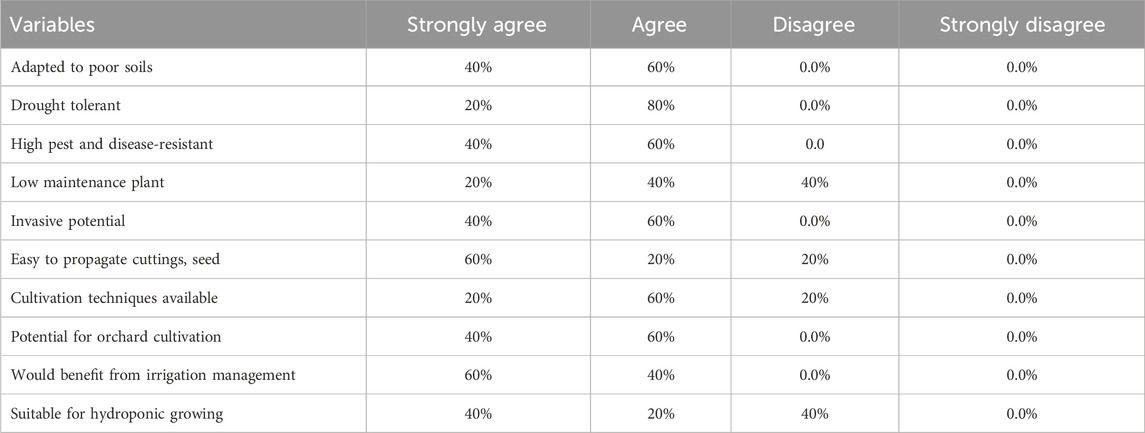
Table 4. Knowledge of indigenous trees of participants of the Eastern Cape interviewed for the study.
4.4 Market potential
The responses from the participants revealed a positive outlook on the market potential of D. caffra (Table 5). Respondents strongly agree on its ornamental potential, suitability for agroforestry, and its usefulness as both a food source and for farming purposes such as fodder. Furthermore, the high nutritional value of D. caffra fruit was acknowledged, with most respondents agreeing that it holds significant potential in the health-conscious consumer market. The potential for added-value products, such as jams, juices, and other processed goods, was also recognized, indicating that diversification in product offerings could significantly increase the marketability and profitability of D. caffra. There is a clear consensus on the fruit’s potential to integrate into local diets and be marketed in commercial retail chains, which would enhance its visibility and accessibility to a larger customer base. This finding suggests that with proper marketing strategies, D. caffra could become a mainstream product in both local and international markets.
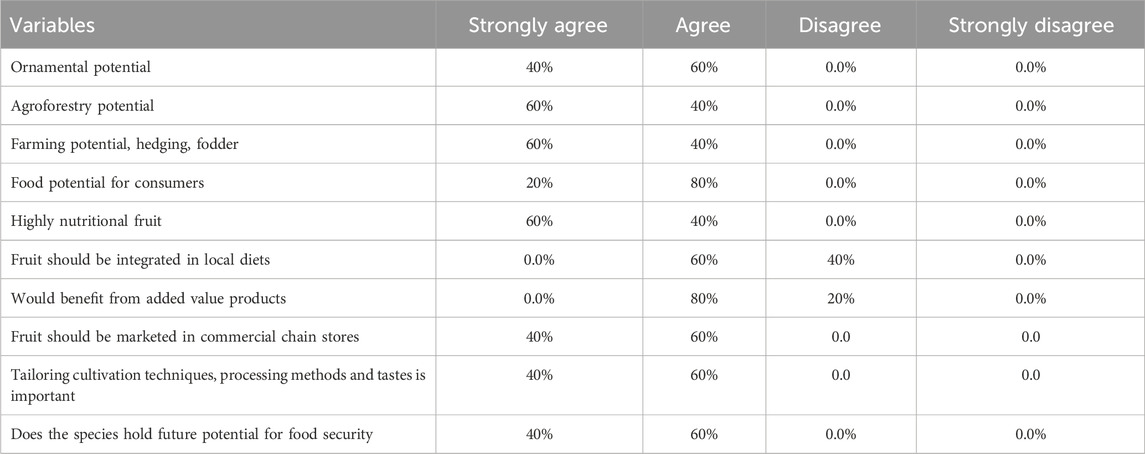
Table 5. The market potential for Dovyalis caffra revealed by participants in the Eastern Cape study.
4.5 Species production and management
The production and management of D. caffra vary significantly among the respondents. Some growers rely on seed propagation, while others use cutting propagation. The latter method is preferred due to its greater consistency in fruit quality and tree growth, but it is more labor-intensive and requires technical knowledge. The study found that while D. caffra is generally low-maintenance and drought-resistant, it still requires specific growing conditions, including well-drained soils and periodic irrigation. Respondents also noted the occasional pest and disease challenges, although these were not seen as major threats. The scarcity of high-quality cultivars and limited access to expert guidance were identified as key challenges hindering the industry’s growth. The lack of standardized cultivation techniques and propagation methods further complicates large-scale production, limiting the tree’s potential as a sustainable resource for agroforestry and commercial markets (Venter and Witkowski 2013).
To address these challenges several mitigation strategies are recommended:
Farmers training and education- Growers can receive training that can give them the knowledge and skills required for efficient irrigation, pest control, and propagation. With the help of agricultural extension services, training sessions can give growers the technical know-how required for efficient soil, pest, and propagation management. Nurseries and horticulturists can boost propagation effectiveness and enhance tree and fruit quality by also taking lessons about grafting and budding (Reeves and Hibberd, 2023).
Cultivar development- Research on better cultivars is essential to filling in the gaps in fruit quality and pest resistance. Creating cultivars with less sour fruit, more resistance to pests and diseases, and greater suitability for large-scale production can improve economic viability. Such initiatives may involve collaboration with agricultural research institutions to develop cultivars suited to the area conditions.
Strengthening the value chain- Improving market access is key to making D. caffra a commercially viable crop. This could involve reinforcing connections among producers, processors, and markets, including local and regional food networks or export markets for distinctive fruits. Farmers could form partnerships or commercial entities that can enhance value chains to make sure small farmers, nurseries, and street vendors benefit from increased demand.
4.6 Data base search
4.6.1 Underutilized indigenous species in the Eastern Cape
This study also highlighted other underutilized indigenous plant species in the Eastern Cape that hold comparable ecological and economic significance. While many of these species, such as Sclerocarya birrea (Marula) and Vangueria infausta (Wild Medlar), are already commercially recognized, D. caffra stands out due to its hardiness and versatility. The identification of these species underscores the untapped potential of the region’s biodiversity and presents opportunities for expanding the scope of indigenous plant cultivation. Further research and market exploration of these species could foster the development of a more diverse and sustainable agroforestry industry in the Eastern Cape, benefiting local communities economically and ecologically.
4.6.2 Dovyalis species and their characteristics
The comparison of various Dovyalis species revealed their distinct growth patterns, fruit characteristics, and uses. While D. caffra (Kei apple) is the most widely recognized for its hardiness and multiple uses (fencing, food, and agroforestry), other species like Dovyalis hebecarpa (Ceylon gooseberry) and Dovyalis rhamnoides (Rhamnus African Apricot) as illustrated in Table 6 show promise for different purposes, such as jam production and medicinal uses. These species contribute to the diversity of Dovyalis cultivation and indicate the potential for diversification in agroforestry systems. The varying characteristics and uses of these species highlight the need for targeted research to optimize their cultivation and commercialization.
4.6.3 Economic viability and market potential
The study underscores the economic viability of cultivating indigenous trees like D. caffra in the Eastern Cape. It is characterized by diverse ecosystems, including forests, coastal regions, and grasslands. Indigenous trees are essential to the preservation of cultural heritage, local economic growth, and biodiversity in the Eastern Cape (Cocks and Dold, 2006; Singh, 2024). Indigenous trees play a vital role in maintaining the ecological balance of the Eastern Cape by providing habitat for a wide range of fauna and flora, thereby promoting biodiversity (Singh, 2024). Examples of these species include the Yellowwood (Podocarpus spp) and the Knob Thorn (Acacia nigrescens), which are essential to local ecosystems and support wildlife by providing food and shelter, as well as contributing to soil health through their root systems that prevent erosion (Moll, 2012). Additionally, compared to non-native species, indigenous trees are better adapted to the local climate because their deep-rooted roots allow them to access groundwater during dry spells, making them more resilient to droughts which is a crucial factor considering the region’s unpredictable climate.
For communities in the Eastern Cape, the cultivation of indigenous trees has a major economic impact. Local businesses can be supported by producing wood from these trees, and sustainable methods that do not deplete resources are ensured. Locally grown fruit-bearing trees, such as the Marula (S. birrea) yield food items that can be harvested responsibly and sold domestically and abroad (Emanuel et al., 2005). A recent study by Chauke et al. (2025) reports that the fruit and other goods made from marula have done well in the commercial market. Furthermore, when integrated with agricultural crops in agroforestry systems, native trees have a function. This method increases soil fertility, gives crops shade, and generates extra cash from the sale of tree products like nuts and fruits.
Planting native trees improves soil fertility by adding organic matter, repairing degraded areas, and boosting carbon sequestration capacity. All these benefits translate into improved environmental health (Sang et al., 2013). These ecological benefits are vital for reducing the negative impacts of climate change on rural communities. Consumers are increasingly supporting businesses that use sustainable practices. This shift makes a customer base willing to pay a premium for indigenous trees that benefit local ecosystems (Sang et al., 2013). Many businesses recognize their role in promoting sustainability through corporate social responsibility (CSR) initiatives such as tree planting programs or collaborations with local nurseries specializing in indigenous species (Heslin and Ochoa, 2008). By cultivating an environment where tree farming is economically beneficial, socially enriching, and environmentally sustainable, stakeholders can collaborate to create greener habitats that benefit both people and nature.
5 Conclusion
This study offers a thorough examination of the opportunities and challenges surrounding the cultivation and commercialization of D. caffra (Kei Apple) in the Eastern Cape. The findings suggest that while the tree holds significant economic potential, considerable gaps remain in knowledge related to propagation techniques, cultivation practices, and market awareness. Addressing these gaps through focused research, farmer education, and market expansion will be crucial in unlocking the full potential of D. caffra and other indigenous species in the region. Promoting the cultivation of indigenous species can enhance food security, foster sustainable agricultural practices, and contribute to local economic development in the Eastern Cape. The improvement of production methods for D. caffra has significant potential to enhance food security, boost economic growth, and promote environmental sustainability. As an underutilized indigenous species, D. caffra is highly adaptable to challenging climatic conditions, making it an excellent candidate for agroforestry, commercial farming, and as a nutritional supplement.
Despite its many advantages, challenges such as limited propagation techniques, a lack of standardized cultivation methods, and low market awareness continue to hinder its widespread adoption. However, by refining production methods, investing in research, and offering education to farmers, D. caffra can be developed into a more sustainable resource. Future research should focus on improving propagation techniques, boosting fruit yield through better irrigation and pruning practices, and exploring value-added products to increase market appeal. With the growing demand for resilient, nutrient-dense crops, D. caffra presents a promising opportunity for agro-processing industries, rural employment, and environmental conservation. By cultivating collaborations among local farmers, researchers, and policymakers, the full potential of this indigenous tree can be realized, ensuring its critical role in sustainable agriculture and food security for future generations.
Author contributions
MM: Writing – original draft. CL: Writing – review and editing. HW: Project administration, Visualization, Conceptualization, Funding acquisition, Writing – review and editing, Supervision.
Funding
The author(s) declare that financial support was received for the research and/or publication of this article. The National Research Foundation and GMRDC is thanked for the financial support. National Research Foundation (NRF) grant number TJ37; Govan Mbeki Research and Development Centre (GMRDC) grant number C461.
Conflict of interest
The authors declare that the research was conducted in the absence of any commercial or financial relationships that could be construed as a potential conflict of interest.
Generative AI statement
The author(s) declare that no Generative AI was used in the creation of this manuscript.
Any alternative text (alt text) provided alongside figures in this article has been generated by Frontiers with the support of artificial intelligence and reasonable efforts have been made to ensure accuracy, including review by the authors wherever possible. If you identify any issues, please contact us.
Publisher’s note
All claims expressed in this article are solely those of the authors and do not necessarily represent those of their affiliated organizations, or those of the publisher, the editors and the reviewers. Any product that may be evaluated in this article, or claim that may be made by its manufacturer, is not guaranteed or endorsed by the publisher.
References
Al-Habib, A., Al-Saleh, E., Safer, A. M., and Afzal, M. (2010). Bactericidal effect of grape seed extract on methicillin-resistant Staphylococcus aureus (MRSA). J. Toxicol. Sci. 35 (3), 357–364. doi:10.2131/jts.35.357
Al-Rajhi, A. M., Salem, S. S., Alharbi, A. A., and Abdelghany, T. M. (2022). Ecofriendly synthesis of silver nanoparticles using Kei-apple (Dovyalis caffra) fruit and their efficacy against cancer cells and clinical pathogenic microorganisms. Arabian J. Chem. 15 (7), 103927. doi:10.1016/j.arabjc.2022.103927
Ali, A. C., Uetimane, E., Lhate, I. A., and Terziev, N. (2008). Anatomical characteristics, properties and use of traditionally used and lesser-known wood species from Mozambique: a literature review. Wood Sci. Technol. 42, 453–472. doi:10.1007/s00226-008-0186-5
Amuri, B., Maseho, M., Simbi, L., Okusa, P., Duez, P., and Byanga, K. (2017). Hypoglycemic and antihyperglycemic activities of nine medicinal herbs used as antidiabetic in the region of Lubumbashi (DR Congo). Phytotherapy Res. 31 (7), 1029–1033. doi:10.1002/ptr.5814
Augustyn, W. A., Regnier, T., De Jager, K., Hajari, E., Du Preez, R., and Nonyane, D. (2016). A preliminary study on the chemical characteristics of Kei apple (Dovyalis caffra), an undervalued South African fruit. South Afr. J. Bot. 117, 268–275. doi:10.1016/j.sajb.2018.05.032
Azuma, T., Kajita, T., Yokoyama, J., and Ohashi, H. (2000). Phylogenetic relationships of Salix (Salicaceae) based on rbcL sequence data. Am. J. Bot. 87 (1), 67–75. doi:10.2307/2656686
Baylie, T., Tsega, W., Getinet, M., Abebaw, D., Azanaw, G., Adugna, A., et al. (2024). Evaluation of antioxidant and antihyperglycemic effects Dovyalis Abyssinica (A. Rich). Metab. Open 22, 100286. doi:10.1016/j.metop.2024.100286
Bochi, V. C., Barcia, M. T., Rodrigues, D., and Godoy, H. T. (2015). Biochemical characterization of Dovyalis hebecarpa fruits: a source of anthocyanins with high antioxidant capacity. J. Food Sci. 80 (10), C2127–C2133. doi:10.1111/1750-3841.12978
Celep, G. S., Rastmanesh, R., and Marotta, F. (2014). “Microbial metabolism of polyphenols and health,” in Polyphenols in human health and disease (Academic Press), 577–589.
Chauke, H., Silue, Y., Aremu, A. O., and Fawole, O. A. (2025). Nutritional values, phytochemical composition and bioactivities of Sclerocarya birrea (Marula) seeds and its potential applications: current research and future directions. South Afr. J. Bot. 179, 188–197. doi:10.1016/j.sajb.2025.02.008
Clark, K. H., and Nicholas, K. A. (2013). Introducing urban food forestry: a multifunctional approach to increase food security and provide ecosystem services. Landsc. Ecol. 28, 1649–1669. doi:10.1007/s10980-013-9903-z
Clement, R. P., Runyogote, J., Raymond, J., and Chacha, M. N. (2023). Ethnobiological survey to determine the link between health benefits and qualities of Maasai traditional food system in Monduli, Arusha, Tanzania. Agroecol. Sustain. Food Syst. 47 (8), 1077–1124. doi:10.1080/21683565.2023.2229786
Cocks, M. L., and Dold, A. P. (2006). Cultural significance of biodiversity: the role of medicinal plants in urban African cultural practices in the Eastern Cape, South Africa. J. Ethnobiol. 26 (1), 60–81. doi:10.2993/0278-0771(2006)26[60:csobtr]2.0.co;2
Dawson, I. K., Leakey, R., Clement, C. R., Weber, J. C., Cornelius, J. P., Roshetko, J. M., et al. (2014). The management of tree genetic resources and the livelihoods of rural communities in the tropics: non-timber forest products, smallholder agroforestry practices and tree commodity crops. For. Ecol. Manag. 333, 9–21. doi:10.1016/j.foreco.2014.01.021
Dharani, N. (2019). Field guide to common trees and shrubs of East Africa. South Africa: Penguin Random House.
Emanuel, P. L., Shackleton, C. M., and Baxter, J. S. (2005). Modelling the sustainable harvest of Sclerocarya birrea subsp. caffra fruits in the South African lowveld. For. Ecol. Manag. 214 (1-3), 91–103. doi:10.1016/j.foreco.2005.03.066
FAO (1996). Declaration on world food security and world food summit plan of action, 1996. Rome, Italy: FAO, 13–17.
Grainger, M. J., van Aarde, R. J., and Wassenaar, T. D. (2011). Landscape composition influences the restoration of subtropical coastal dune forest. Restor. Ecol. 19 (101), 111–120. doi:10.1111/j.1526-100x.2009.00630.x
Heslin, P. A., and Ochoa, J. D. (2008). Understanding and developing strategic corporate social responsibility. Organ. Dyn. 37, 125–144. doi:10.1016/j.orgdyn.2008.02.002
Jones-Garcia, E., and Krishna, V. V. (2021). Farmer adoption of sustainable intensification technologies in the maize systems of the Global South. A review. Agron. Sustain. Dev. 41 (1), 8.
Kigen, G., Kipkore, W., Wanjohi, B., Haruki, B., and Kemboi, J. (2017). Medicinal plants used by traditional healers in sangurur, elgeyo marakwet county, Kenya. Pharmacogn. Res. 9 (4), 333–347. doi:10.4103/pr.pr_42_17
Kim, Y., and Youjin, Je (2017). Flavonoid intake and mortality from cardiovascular disease and all causes: a meta-analysis of prospective cohort studies. Clin. Nutr. ESPEN 20, 68–77. doi:10.1016/j.clnesp.2017.03.004
Mariod, A. A., and Abdelwahab, S. I. (2012). Sclerocarya birrea (Marula), an African tree of nutritional and medicinal uses: a review. Food Rev. Int. 28 (4), 375–388. doi:10.1080/87559129.2012.660716
Maroyi, A. (2018). Nutraceutical and ethnopharmacological properties of Vangueria infausta subsp. infausta. Molecules 23 (5), 1089. doi:10.3390/molecules23051089
Materechera, S. A., and Swanepol, H. R. (2011). Integrating the indigenous Kei apple (Dovyalis Caffra) into a local permaculture vegetable home eco-gardening system among resource-poor households in a semi-arid environment of South Africa. II Int. Symposium Underutilized Plant Species Crops Future-Beyond Food Secur. 979, 225–232.
Materechera, S. A., and Swanepol, H. R. (2013). Integrating the indigenous Kei apple (Dovyalis Caffra) into a local permaculture vegetable home eco-gardening system among resource-poor households in a semi-arid environment of South Africa. Acta Hortic. 979, 225–232. doi:10.17660/actahortic.2013.979.22
Mdoda, L., Loki, O., and Sikwela, M. M. (2025). Evaluating the economic effect of sustainable agricultural practices on small-scale farmers in the Eastern Cape Province: a propensity score matching analysis. Int. J. Agric. Sustain. 24 (1), 2478733.
Moll, E. J. (1980). A quantitative ecological study of the Hlogwene Forest, Natal. South Afr. For. J. 114 (1), 19–24. doi:10.1080/00382167.1980.9629829
Mucina, L., Adams, J. B., Knevel, I. C., Rutherford, M. C., Powrie, L. W., Bolton, J. J., et al. (2006). Coastal vegetation of South Africa. Veg. S. Afr. Lesotho Swazil. Strelitzia 19, 658–583.
Mutengwa, C. S., Mnkeni, P., and Kondwakwenda, A. (2023). Climate-smart agriculture and food security in Southern Africa: a review of the vulnerability of smallholder agriculture and food security to climate change. Sustainability 15 (4), 2882. doi:10.3390/su15042882
Myers, S. S., Smith, M. R., Guth, S., Golden, C. D., Vaitla, B., Mueller, N. D., et al. (2017). Climate change and global food systems: potential impacts on food security and undernutrition. Annu. Rev. public health 38, 259–277. doi:10.1146/annurev-publhealth-031816-044356
Nkwanyana, M. N. (2013). An ethnobotanical and antidiarrhoeal Investigation of plants used traditionally in the Maputaland area homesteads. Doctoral dissertation, University of Zululand.
Nouman, W., Basra, S., Maqsood, A., Siddiqui, M. T., Yasmeen, A., Gull, T., et al. (2014). Potential of Moringa oleifera L. as livestock fodder crop: a review. Turkish J. Agric. For. 38 (1), 1–14. doi:10.3906/tar-1211-66
Ogbole, O. O., Akin-Ajani, O. D., Ajala, T. O., Ogunniyi, Q. A., Fettke, J., and Odeku, O. A. (2023). Nutritional and pharmacological potentials of orphan legumes: subfamily faboideae. Heliyon 9 (4), e15493. doi:10.1016/j.heliyon.2023.e15493
M. C. Ogwu, S. C. Izah, J. Dessureault-Rompré, and D. Gasparatos (2024). Sustainable soil systems in global South (Springer Nature).
Omotayo, A. O., Ncama, K., and Aremu, A. O. (2018). Potentials of the underutilized Kei-apple (Dovyalis caffra L.): beyond its nutritional and functional value.
Omotayo, A. O., Ncama, K., and Aremu, A. O. (2019). Exploring the diverse potential of underutilized Kei-apple [Dovyalis caffra (Hook. f. and Harv.) Sim]: a multi-purpose fruit tree. Hum. Ecol. 47, 613–618. doi:10.1016/j.jep.2019.1119
Orwa, C. (2009). Agroforestree Database: a tree reference and selection guide. Available online at: http://www.worldagroforestry.org/sites/treedbs/treedatabases.asp.
Pfukwa, T. M., Pheiffer, W., Fawole, O. A., Manley, M., and Mapiye, C. (2022). Cellular antioxidant and viability efficacy of Harpephyllum caffrum peel and Syzygium guineense seed extracts. Food Bioscience 49, 101934.
Qanash, H., Yahya, R., Bakri, M. M., Bazaid, A. S., Qanash, S., Shater, A. F., et al. (2022). Anticancer, antioxidant, antiviral and antimicrobial activities of Kei Apple (Dovyalis caffra) fruit. Sci. Rep. 12 (1), 5914. doi:10.1038/s41598-022-09993-1
Raza, A., Khare, T., Zhang, X., Rahman, M. M., Hussain, M., Gill, S. S., et al. (2025). Novel strategies for designing climate-smart crops to ensure sustainable agriculture and future food security. J. Sustain. Agric. Environ. 4 (2), e70048. doi:10.1002/sae2.70048
Reeves, G., and Hibberd, J. (2023). Cambridge Enterprise Ltd, 2023. Graft-mediated hybridisation of monocotyledonous plants. U.S. Pat. 11 (602), 107.
Rodríguez-García, C., Sánchez-Quesada, C., and Gaforio, J. J. (2019). Dietary flavonoids as cancer chemopreventive agents: an updated review of human studies. Antioxidants 8 (5), 137. doi:10.3390/antiox8050137
Sang, P. M., Lamb, D., Bonner, M., and Schmidt, S. (2013). Carbon sequestration and soil fertility of tropical tree plantations and secondary forest established on degraded land. Plant Soil 362, 187–200. doi:10.1007/s11104-012-1281-9
Santoro, A., Venturi, M., Bertani, R., and Agnoletti, M. (2020). A review of the role of forests and agroforestry systems in the FAO Globally Important Agricultural Heritage Systems (GIAHS) programme. Forests 11 (8), 860. doi:10.3390/f11080860
Sesso, H. D., Gaziano, J. M., Liu, S., and Buring, J. E. (2003). Flavonoid intake and the risk of cardiovascular disease in women. The American Journal of Clinical Nutrition 77 (06), 1400–1408.
Simelane, M. B., Shonhai, A., Shode, F. O., Smith, P., Singh, M., and Opoku, A. R. (2013). Anti-plasmodial activity of some Zulu medicinal plants and of some triterpenes isolated from them. Molecules 18 (10), 12313–12323. doi:10.3390/molecules181012313
Singh, H. (2024). Urban forests, climate change and environmental pollution: Physio- Biochemical and molecular perspectives to enhance urban resilience. Springer Nature.
Stanstrup, J., Rusch, A. M., Agnolet, S., Rasmussen, H. B., Mølgaard, P., Van Staden, J., et al. (2010). Itoside A and 4-hydroxytremulacin from Dovyalis caffra and Dovyalis zeyheri. Biochem. Syst. Ecol. 38 (3), 346–348. doi:10.1016/j.bse.2010.02.006
Tadesse, E. (2023). Attributes, uses, and management of Dovyalis caffra (Kei apple) A Review of literature. Pesticide Sci. Pest Control 1 (2), 2833–0943. doi:10.58489/2833-0943/021
Taher, M. A., Tadros, L. K., and Dawood, D. H. (2018). Phytochemical constituents, antioxidant activity and safety evaluation of Kei-apple fruit (Dovyalis caffra). Food Chem. 265, 144–151. doi:10.1016/j.foodchem.2018.05.099
Venter, S. M. (2012). The ecology of baobabs (Adansonia digitata L.) in relation to sustainable utilization in northern Venda, South Africa. Johannesburg (South Africa): University of the Witwatersrand.
Venter, S. M., and Witkowski, E. T. F. (2013). Where are the young baobabs? Factors affecting regeneration of Adansonia digitata L. in a communally managed region of southern Africa. J. arid Environ. 92, 1–13. doi:10.1016/j.jaridenv.2012.12.010
Waweru, D. M., Arimi, J. M., Marete, E., Jacquier, J. C., and Harbourne, N. (2022). Current status of utilization and potential of Dovyalis caffra fruit: major focus on Kenya-a review. Sci. Afr. 16, e01097. doi:10.1016/j.sciaf.2022.e01097
Wilken, L. E., Kleinert, A., Schmeisser, M., and Dzikiti, S. (2024). Leaf gas exchange, water use, and yield of Marula (Sclerocarya birrea) and Kei Apple (Dovyalis caffra): South African indigenous fruit trees with domestication potential. South Afr. J. Bot. 173, 266–278. doi:10.1016/j.sajb.2024.08.031
Xu, M. Q., Ariyo Okaiyeto, S., Niu, X. X., Wang, Q. H., Vidyarthi, S. K., Wang, H., et al. (2025). Bioactive compounds and Health functions of plums: current status and future opportunities. Food Rev. Int. 41 (5), 1360–1389. doi:10.1080/87559129.2024.2442666
Yang, K., Song, X., Cheng, C., Shi, Q., Li, X., Long, J., et al. (2025). Association between dietary inflammatory potential and liver cancer risk: a systematic review and dose-response meta-analysis. Nutr. Cancer 77 (4-5), 433–443. doi:10.1080/01635581.2025.2471619
Keywords: climate change, food security, indigenous trees, in-depth interviewing, market information, Kei-apple
Citation: Mfini M, Laubscher CP and Witbooi H (2025) Optimization of production strategies for African indigenous trees: a case study of tree growers and sellers of Dovyalis caffra (Kei apple) from Eastern Cape of South Africa. Front. Food Sci. Technol. 5:1631026. doi: 10.3389/frfst.2025.1631026
Received: 19 May 2025; Accepted: 17 September 2025;
Published: 03 October 2025.
Edited by:
Nomali Ngobese, North-West University, South AfricaReviewed by:
Diego Fernando Roa-Acosta, University of Cauca, ColombiaBhekisisa Dlamini, University of Johannesburg, South Africa
Copyright © 2025 Mfini, Laubscher and Witbooi. This is an open-access article distributed under the terms of the Creative Commons Attribution License (CC BY). The use, distribution or reproduction in other forums is permitted, provided the original author(s) and the copyright owner(s) are credited and that the original publication in this journal is cited, in accordance with accepted academic practice. No use, distribution or reproduction is permitted which does not comply with these terms.
*Correspondence: H. Witbooi, aHdpdGJvb2lAdWZoLmFjLnph
 M. Mfini
M. Mfini C. P. Laubscher
C. P. Laubscher H. Witbooi
H. Witbooi
